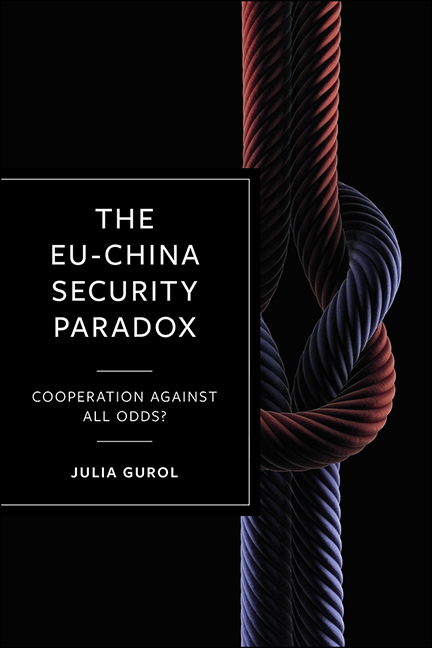Book contents
- Frontmatter
- Contents
- List of Figures
- List of Tables
- List of Abbreviations
- About the Author
- Acknowledgements
- 1 The EU and China in a Changing International Environment
- 2 Analytical Framework: Towards Multidimensionality
- 3 The EU’s and China’s Foreign and Security Policy Principles
- 4 The EU and China on the Global Stage: Interests and Interdependence
- 5 Framing and Perceptions in EU–China Security Relations
- 6 EU–China Relations on Anti-Terrorism
- 7 EU–China Relations on Maritime Security and Anti-Piracy
- 8 EU–China Relations on Climate and Energy Security
- 9 The US: An Elephant in the Room for EU–China Security Relations
- 10 Conclusion and Outlook: The EU and China at a Crossroads
- Notes
- References
- Index
5 - Framing and Perceptions in EU–China Security Relations
Published online by Cambridge University Press: 15 September 2022
- Frontmatter
- Contents
- List of Figures
- List of Tables
- List of Abbreviations
- About the Author
- Acknowledgements
- 1 The EU and China in a Changing International Environment
- 2 Analytical Framework: Towards Multidimensionality
- 3 The EU’s and China’s Foreign and Security Policy Principles
- 4 The EU and China on the Global Stage: Interests and Interdependence
- 5 Framing and Perceptions in EU–China Security Relations
- 6 EU–China Relations on Anti-Terrorism
- 7 EU–China Relations on Maritime Security and Anti-Piracy
- 8 EU–China Relations on Climate and Energy Security
- 9 The US: An Elephant in the Room for EU–China Security Relations
- 10 Conclusion and Outlook: The EU and China at a Crossroads
- Notes
- References
- Index
Summary
Introduction
In general, the concept of security has been evolving since the end of the Cold War (Fanoulis and Kirchner, 2016). While it has been conflated with national security, focusing on military power and strength, the scope and degree of security are widening. Not only has the nature of security changed, its framing by political actors, the measures taken to tackle security issues and the resulting policy implications have changed significantly (Bourne, 2013). Security is no longer understood only in the traditional sense, focusing on challenges to nation-states and their territorial integrity or sovereignty. Instead, new, non-traditional security issues have emerged over time, which are more transnational. Examples of such issues are climate change, pandemics, global poverty, food and water scarcities, cyber-crimes (including cyber-terrorism), arms proliferation, and piracy. Traditional approaches to dealing with security have proven inadequate to combat the newer threats that are more mobile and fluid. This development has affected the EU and China equally and has led to a great deal of security cooperation, driven by the understanding of the changing nature of security threats that exceed the national scope and therefore require joint responses (Christiansen et al, 2019, p 122). This fact notwithstanding, significant normative differences prevail regarding how the EU and China seek to react to security threats – the EU wields a larger toolkit of non-military or civilian security response measures than China does. It is particularly in that non-military space that EU–China security cooperation unfolds most fruitfully.
Looking at EU–China security cooperation from a more constructivist vantage point, it is worth examining how the two define their own roles as security actors in the international system, as well as how they perceive each other. This chapter explores how the EU and China understand their positions in global security governance and whether and how these self-conceptions influence their bilateral security relations. The chapter begins with a comparative examination of how the EU and China frame ‘security’. Subsequently, it analyses their self-conceptions and the perceptions they hold of each other as security actors. It concludes by discussing elements that foster or impede security cooperation between the EU and China.
- Type
- Chapter
- Information
- The EU-China Security ParadoxCooperation against All Odds?, pp. 61 - 82Publisher: Bristol University PressPrint publication year: 2022



